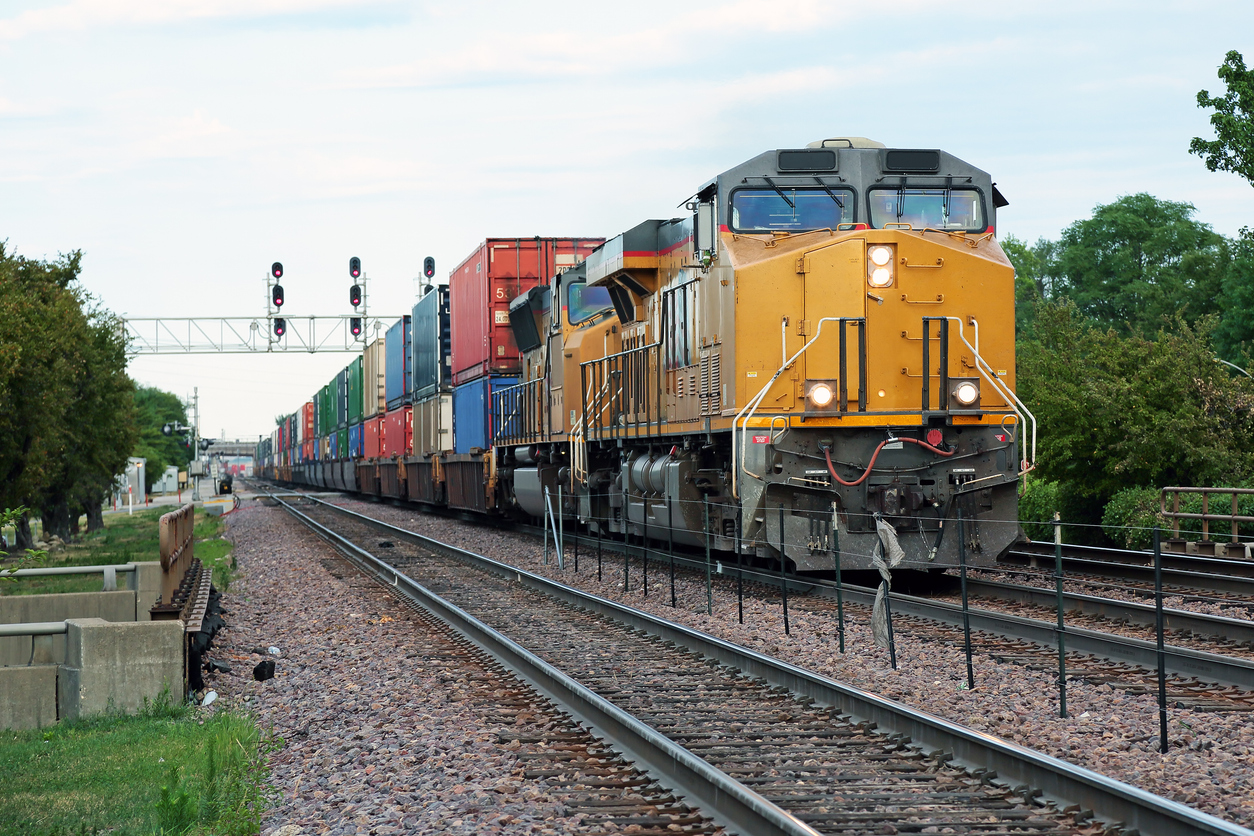
Two yellow locomotives and double stack freight train passing through town
Work stoppages and strikes are known to wreak havoc on supply chains, causing challenges for anyone relying upon the smooth movement of goods. While there are no simple or foolproof solutions, a strong third party logistics (3PL) partner can anticipate disruption and mitigate the impacts these stoppages have upon the customer.
This blog looks at the challenges these work stoppages present, while also detailing the ways that Canadian Alliance Terminal rises to the challenge for the benefit of its customer base.
The Broad Impact of Work Stoppages and Strikes on Supply Chains
The primary impacts of a work stoppage are obvious: goods stop moving! That’s not all, however. Port, rail, trucking, and shipping all play pivotal roles in the supply chain, and are all intertwined. A stoppage in one area will have ripple effects that reverberate throughout the supply chain.
Bottlenecks are created. Raw materials fail to reach their destination, thus impacting the manufacturing sector. Suppliers may incur penalties from their customers. Relationships are strained. Inventory levels are increased in order to buffer against further delays. The economy takes a hit, and, along with it, the reputation of the shipping company, the supplier, and even the country. The price of these complications is ultimately paid for consumers, driving inflation.
Impacts of a Canadian Rail Strike
Consider the impacts of a Canadian rail strike. Goods that arrive at the Port of Montreal, destined for Vancouver, or vice versa, are unable to be moved by rail. Instead, this cargo will have to be shipped by truck. Under normal circumstances, this would mean an approximate 30% hike in shipping expenses. During a rail strike, however, there is a surge in demand for trucking. As a result, prices can fluctuate dramatically, adding further expense. In some cases, equipment and driver shortages eliminate this option altogether.
Air freight remains an option, but this mode of transportation involves even greater premiums, and is also subject to the availability of space.
All of this pends on the ships getting unloaded in the first place. Under normal circumstances, some containers are unloaded directly from the ship to the rail, while other cargo is sent to the yard to be moved by other means. When the rail stops moving, container yards quickly fill, making it impossible to unload ships at all. These ships may be diverted to alternative ports, adding further expense.
The ad hoc nature of these circumstances disrupts business as usual for warehouses and 3PL partners, who are forced to adjust their pricing accordingly.
These complications are not strictly contained to the period of the work stoppage itself. Trucking prices will increase in advance, as anticipation of a strike or lockout builds. When the stoppage ends, there are backlogs to deal with. Clearing these can take some time. Then, of course, there are the penalties and economic fallout to be considered. Cumulatively, the economic impact is substantial.
How CAT Mitigates the Impact of Supply Chain Disruptions
CAT maintains strong connections to all industries involved in transportation. As a result, we’re able to anticipate labour stoppages and plan accordingly.
Our strong network of 3PL partners provide us with options that prove invaluable to our customers during periods of disruption.
Many of our clients ship goods from Europe to Montreal, where a portion of their cargo is normally loaded to rail cars destined for Vancouver. When this becomes impossible, CAT relies upon our world class partner 3PLs to pick up, offload, and palletize containers, before sending them to Vancouver via truck.
As we mentioned, alternative modes of transportation such as trucking and air are subject to availability. This can be tricky during the best of times, and downright difficult during periods of flux. Advance preparation is an imperative, and is just one of the advantages of dealing with a well connected and experienced Number 1 3PL partner like Canadian Alliance Terminals.
Yes, these solutions come with additional costs, but they are preferable to the alternative: goods that are left in flux, providing the shipper with no option but to wait for labour disputes to resolve themselves. Failure to fulfill the order on time can result in financial penalties. Furthermore, the vendor may be downgraded to online only, as opposed to in store sales. Obviously, these fates are to be avoided at all costs.
CAT’s Response to the 2023 Port of Vancouver Strike
The 2023 Port of Vancouver strike provides another example of a challenge that CAT helped its customers overcome. CAT successfully mitigated disruptions by proactively rerouting shipments through alternative ports in Seattle and Prince Rupert. Anticipating delays, CAT increased its warehousing capacity and implemented advanced inventory management systems to handle the backlog efficiently. The company also leveraged air freight for time-sensitive deliveries, despite the higher costs, to maintain customer satisfaction. Additionally, CAT maintained constant communication with clients, providing real-time updates and managing expectations effectively. These strategies not only minimized the strike’s impact but also strengthened CAT’s reputation as a reliable logistics partner during crises.
The Value of Experience and Preparation
Managing work stoppages that affect logistics is no easy task. Even the best planned efforts can’t guarantee success. When the disruption is caused by natural disasters or other unforeseen events, the challenge becomes even more profound. Regardless, preparation and experience are valuable tools. Canadian Alliance Terminals a best in class 3PL was established in 1999, which means that we’ve overcome more than a few trials. Furthermore, we’ve established a strong network of partnerships that stretch near and far, placing us in an optimal position to respond to whatever challenges come our way.
